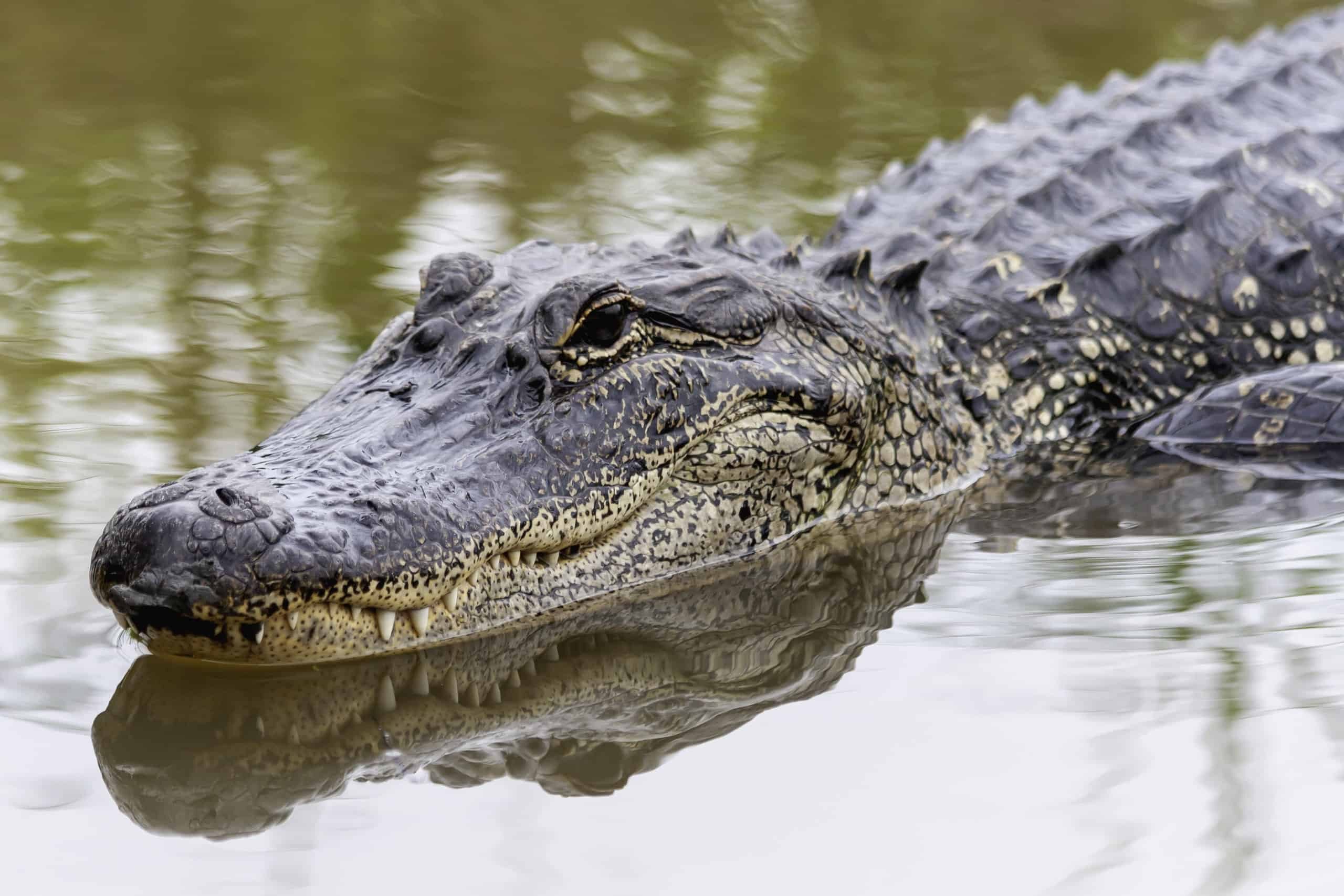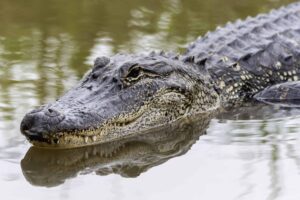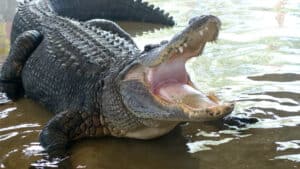Alligators are not native to Montgomery County, Alabama. However, you’re likely to encounter occasional gators wallowing in the willows or swimming in Montgomery’s lakes, rivers, ponds, and wetlands. There have been several sightings of alligators within the reaches of the city recently, although the reptiles are rare enough to draw attention when spotted.
But let not alligators’ shy and harmless nature deceive you; it’s not uncommon for these creatures to attack and injure people. The reptiles can be deadly if provoked.
Where Can You Find Alligators in Montgomery?
American alligators (Alligator mississippiensis) are giant lizard-like reptiles of the crocodilian family that inhabit fresh and saltwater. Full-grown adult alligators can grow up to 6-13 feet and weigh over 500 pounds. Alligators also have an impressive lifespan, with some living over 50 years in the wild.
They are most active from April to October, as they spend cooler months mainly in the water. The best way to see the reptiles in Montgomery is to take a guided tour at the Montgomery Zoo.
Thanks to the habitat and climate of the region, alligators can also be found in the wetlands of Montgomery. You can spot the animals in coastal marshes, natural lakes, swamps, riverine wetlands, ponds, and some reservoirs. The reptiles like to migrate up river systems seasonally during spring and winter in search of food sources, mating partners, and suitable nesting sites.
Furthermore, many anonymous people have called to tip authorities about alligator sightings in people’s homes. But in their natural environment, gators are most common in Lake Conroe and San Jacinto River.
Alabama has also listed alligators as endangered species due to hunting and habitat loss. And due to the conservation efforts in the state, the number of gators has been on a steady rise in the recent past.
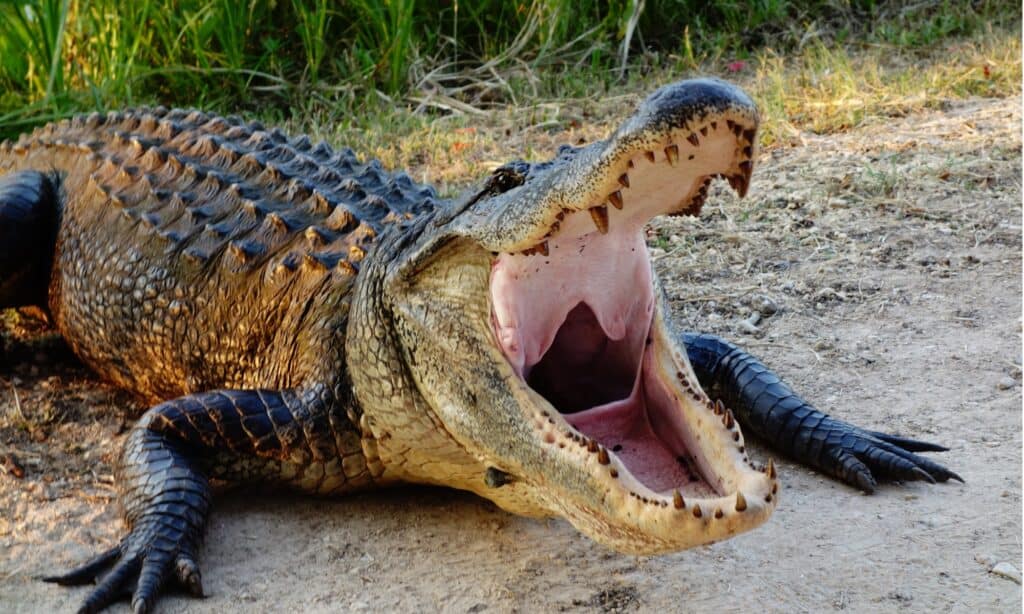
Alligators have sharp teeth and a powerful bite, but when given respect and handled cautiously, they can be admired from a safe distance.
©iStock.com/Alex Pankratov
Can You Swim with Alligators?
It’s best to avoid swimming in water bodies inhabited by gators. Or at least, do not swim alone. Remember, the bigger the gator, the bigger the prey it can consume. So, swimming or playing in waters that harbor large alligators can be a serious hazard.
If swimming is allowed, stick to areas designated as safe for swimming. Look out for posted signage, if any, and follow it.
What’s more, alligators are usually shy and fearful of human contact. These animals are solitary like most other crocodilians and prefer to be left alone. Also, a splash potentially indicates a vulnerable meal for the alligator — especially since it’s unable to see you clearly in the murky water. So, they may mistake a swimmer for prey and strike.
Besides, a female may be around with her young ones or eggs. As a result, she will be far more protective and aggressive than the norm.
Not just that. Swimming in alligator-infested waters at night, dusk, or dawn is highly discouraged. Alligators are most active between dusk and dawn. The creatures usually feed during this period. So if you intend to go swimming, plan your adventure during the day to reduce the possibility of conflict with these creatures.
It is also worth noting that alligators can stay submerged for up to 24 hours. But they usually like to dive into the water regularly and hold their breath for 20-40 minutes. So don’t assume that the reptiles are not there just because you can’t see them on the surface.
Do Alligators Attack Humans?
Unlike their cousins, the crocodiles, alligators are neither typical man-killers nor fussy eaters. Cases of unprovoked alligator attacks are few and far between. And it’s improbable that an alligator will attack and make a meal of a human. Their diet is primarily fish, birds, mollusks, snakes, turtles, and small mammals such as deer and rats.
Nevertheless, while they aren’t typically aggressive, these reptiles will attack to protect themselves or their nests should they feel threatened. But these attacks are not about aggression so much as they are about defense. When they attack, they are known to bite their prey with just one puncture wound before releasing.
Also, these predators are very opportunistic feeders. Gators won’t hesitate to gobble up a free meal like any other carnivore. So, they will jump at the opportunity to eat any animal, including a human, if they come by. Here are situations when alligators are most likely to attack you:
When There Are Alligators Basking
Alligators will try to stay away from you as much as they can. But if you move within striking distance of a gator while sunbathing or sleeping, it may feel threatened, act on instinct, and attack. Alligators like to bask or sleep at the bank of water bodies or inside heavy vegetation near the water’s edge.
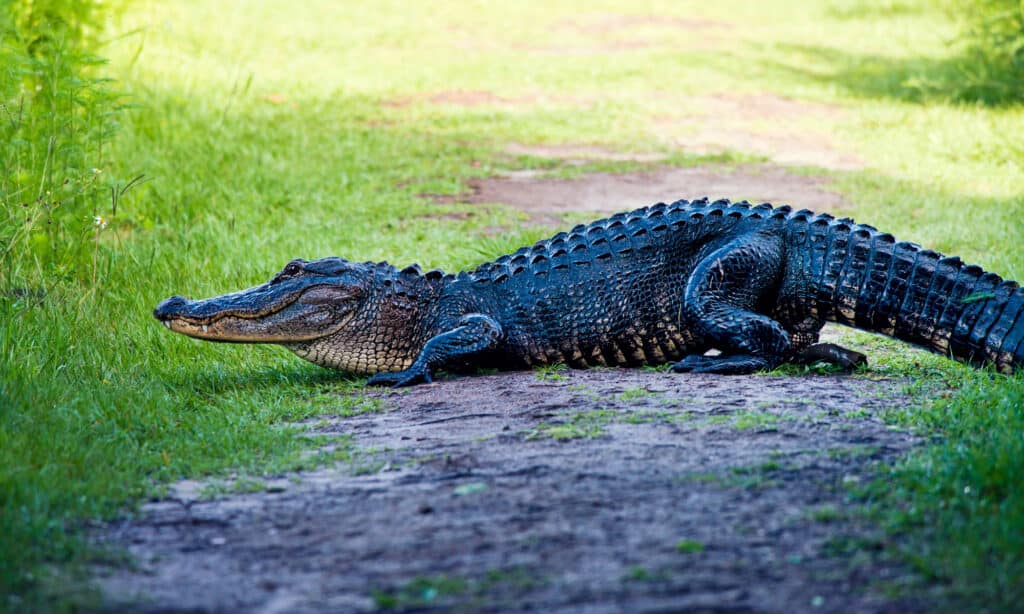
If you move within striking distance of a gator while sunbathing or sleeping, it may feel threatened, act on instinct, and attack.
©Svetlana Foote/Shutterstock.com
When You Approach a Female Nesting Alligator
As mentioned earlier, moving near a female gator with eggs or young ones can be dangerous. The female may believe that her eggs or babies are at threat and decide to take defensive action to protect them. You should be extra wary around May and June during nesting season, when the mothers will protect their eggs, and through spring, when the gators begin mating.
If the Alligators Are Used to Being Fed
Feeding alligators not only makes them bolder and less fearful of people but also makes them start associating humans with food. These reptiles can be reasonably intelligent and quickly learn where to get free handouts.
Therefore, feeding the reptile will only encourage its presence in that area. As a result, there is a higher likelihood of being seriously injured in a random attack by an unexpected gator.
When They Are Moving Around
Alligators like to move during the mating season in spring and summer, searching for mating partners and breeding sites. During this period, they are most active, aggressive, and are more likely to attack. So, when you meet an alligator on the move, it’s advised to move away from its path and not approach it.
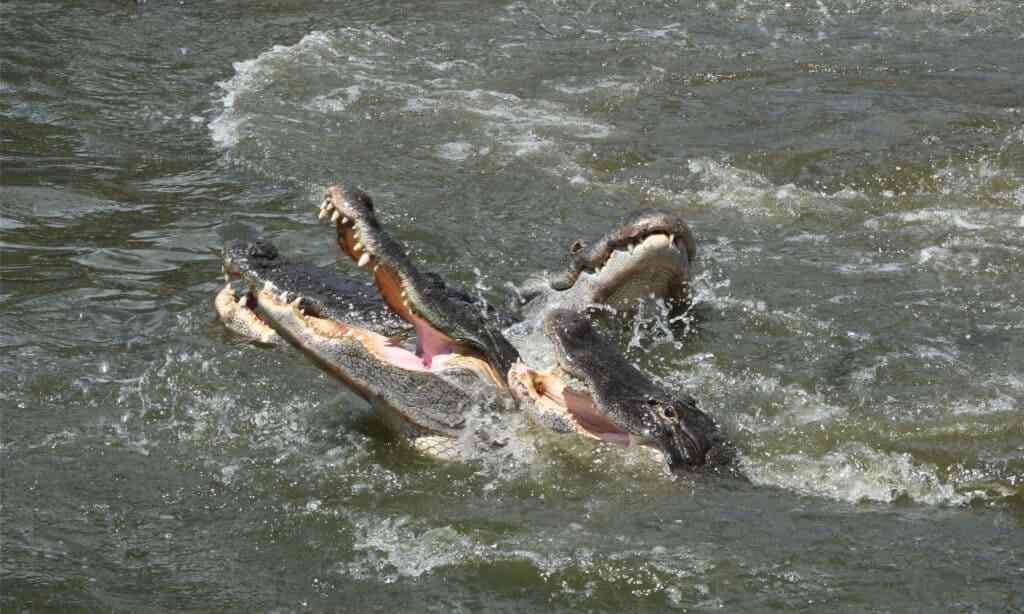
During mating season alligators are most active, aggressive, and are more likely to attack.
©iStock.com/Nigel Stripe
How To Avoid An Alligator Encounter in Montgomery
- Don’t move too close to an alligator. Always keep a safe distance of at least 30 – 60 feet from alligators. If you find an alligator and it hisses or lunges at you, then you will have moved too close.
- Never try to scare, ambush, corner, or ward off alligators. The animals may feel threatened and react defensively.
- Avoid contact with gators or getting in their way if you participate in recreational water activities, such as skiing, kayaking, canoeing, or even taking photos.
- Avoid walking on the vegetation along the water’s edge. Alligators like to bask and ambush prey in these areas.
- Don’t swim alone.
- Don’t swim at night.
- Don’t feed the alligators. They may become too familiar with humans, lose their fear of people, and associate humans with food.
- Avoid feeding fish, ducks, turtles, or other wildlife inhabiting the waters with gators. The food may attract the reptiles, besides training them to associate people with food.
- When fishing in waters inhabited by gators, be cautious as some may try to grab a hooked fish or swallow the fish on a stringer.
- If you’ve gone fishing, don’t clean the fish in the water or leave the bait or scraps on the ground. The leftovers may also be a potential food source for gators.
- Pets and children should never move near alligators. When hungry, the reptiles may mistake pets for their natural prey. Consequently, the gator may act on its hunting instincts and try to feed on the pet. So if you are around alligators and have your house pet with you, always keep the pet on a leash.
What To Do If An Alligator Attacks
If an alligator lunges towards you, run away as fast as possible while screaming and flailing your arms. The alligator will likely back off from any sudden movements or loud noises.
Alligators may be oversized animals with short legs, but they are surprisingly fast on land and can reach up to 35 miles per hour. Alligators may be giant animals with short legs but can move with a surprising burst of speed. However, gators do not have aerobic metabolism, meaning their muscles get a limited oxygen supply. As a result, they get tired quickly and can only sprint over short distances.
Contrary to the popular belief that running in a zig-zag pattern will give you an advantage, the pattern will only shorten the distance between you and the beast. This will give it a chance to catch up with you and attack. So it’s best to run away from the gator as fast as possible in a straight line.
Also, it is worth noting that alligators are good climbers. They can scale high obstacles such as chain link fences in their paths. But the animal will possibly have the upper hand if a gator fights you on its turf, so it is best to admire them from a safe distance. It would be interesting to note that alligators are better swimmers than humans. Therefore, it’s best to stay out of the water in an alligator-infested area.
Moreover, be careful not to let it snap and bite your hands or feet with its toothy snout. But as is often the case, an alligator will bite and then let go or loosen their grip immediately. If this happens, use this opportunity to escape if possible.
If not, try to reach for its eyes and poke them. Try to fight back as hard as you can until it lets go. Should the animal try to roll, grab the edges of its lower jaw and try to keep it shut while you attempt to push your way out. But your goal should be convincing the animal that you are not up to trouble.
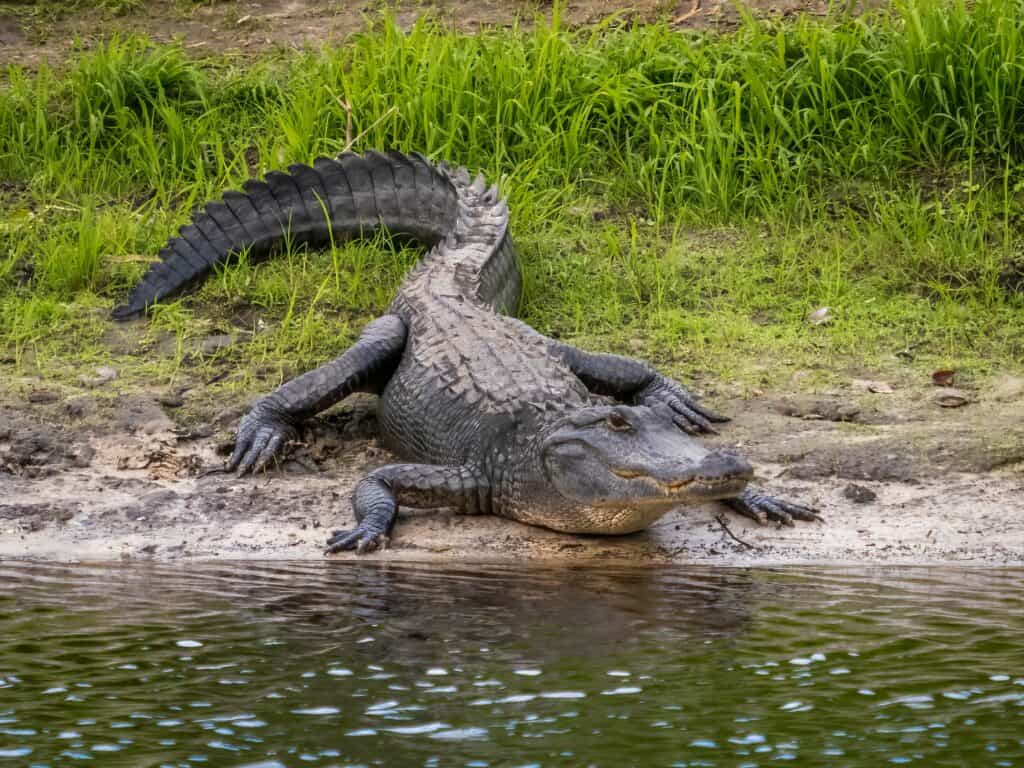
Avoid walking on the vegetation along the water’s edge since Alligators like to ambush prey in these areas.
©Jim Schwabel/Shutterstock.com
What Do You Do If You Encounter An Alligator In Montgomery?
Although alligator encounters are a rarity in Montgomery, it’s possible to see the reptiles wandering about. And if unprovoked, they will seldom, if ever, harm you. But as a precaution, keep your distance if you encounter one, and maintain it until it moves away. Do not make sudden movements or loud noises that will startle the animal. It will be highly unlikely that the gator will attack you.
However, if you’re still concerned or threatened about its behavior, do not hesitate to call the park wardens, animal control officers, or alligator trappers to resolve the situation.
Do Alligators Hibernate?
Alligators do not hibernate. Instead, when temperatures drop and become too cold for them to stay out in the open, the cold-blooded animals brumate or become semi-dormant. This is a reptilian equivalent of hibernation.
During this dormancy phase, mainly in winter, gators will get into a long sleep until the atmosphere heats up again. They hide in holes, dig along the waterway, labyrinths above the ground, or excavate in banks.
During this phase, the gators experience very low body temperatures, and metabolic rates, with slow heartbeat and breathing. But they can still be active year-round. Although they stop eating, they will still move around and remain conscious of their environment.
Can You Hunt Alligators in Montgomery?
Hunting, killing, or keeping alligators captive in the US is illegal. However, the state of Alabama allows people to hunt down the reptile during the state’s annual alligator hunt in August.
Always Stay Safe
Seeing alligators in their natural habitat can be an exciting experience, but it’s important to remember that they are wild animals and should always be respected. Alabama has approximately 70,000 alligators, so taking the necessary steps to stay safe while enjoying the view is essential. Keeping a distance from them and being aware of your surroundings is necessary to avoid negative interactions. If you remain cautious and act responsibly, you can still admire these creatures without putting yourself in danger.
Thank you for reading! Have some feedback for us? Contact the AZ Animals editorial team.

